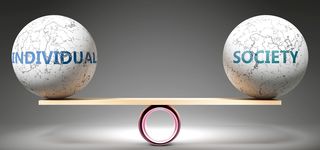Environment
Developing a Healthy Relationship With Society and Humanity
Some potential positive implications from our experience with the pandemic.
Posted April 13, 2020 Reviewed by Lybi Ma

Global disasters usually bring about three clear things:
1. Greater intolerance
2. Greater collaboration
3. Governmental shock reaction
For example, in the recent coronavirus (COVID-19) outbreak, which on March 11, 2020, had been classified as a pandemic by the World Health Organization, these three components were readily transparent. There were:
1. Clear increases in xenophobic attacks, self-interested panic buying
2. A worldwide effort to produce and distribute ventilators to countries that needed them, and coordinated efforts to identify a vaccine
3. A shock reaction to lock down large parts of the nations around the world
When people are fearful, it is easy to see how all three of these components come into action. For example, people are angry, and some begin to scapegoat and discriminate against a group of people. People want to solve a common problem, so collaboration also becomes more focused, with greater effort towards a common goal (vaccine, ventilators), often at the expense of other organizational-level objectives and goals. Finally, shock reaction is also expected, as governments around the world want to prevent a total collapse of the basic societal provision at all costs.
Not all global disasters have only negative effects, though. For example, in 1918, the Spanish flu helped bring about national health services in many European countries. The great depression helped bring about the welfare state to support those most in need. Likewise, sometimes global or national disasters can lead to shock measures, which citizens of a state may feel are draconian: For example, September 11 led to a surveillance state being brought about, as governmental organizations wanted to monitor citizens who may threaten the nation.
The world has seen some turbulent events in the last decade, such as the UK departing from the EU, the rise of ISIS, an endless Syrian civil war, a refugee crisis, the rise of nationalism and populist politics, as well as witnessing the profound impact social media proliferation has on public opinion and even political campaign outcomes.
The lockdown has been labeled the great leveler by many, in that it is thought to have equalized living conditions for the many. However, in a recent BBC News Night current affairs program by Emily Maitlis, she recognized that actually the pandemic affects us in unequal measure, and has been experienced very differently by rich and poor. Those who are in Tower blocks would, of course, find it tougher, and she said, "Those serving on the frontline right now—bus drivers and shelf stackers, nurses, care home workers, hospital staff and shopkeepers are disproportionately the lower paid members of our workforce." These are perhaps some of our most valuable positions in holding society together in a national crisis. Emily goes on to say, "This is a health issue with huge ramifications for social welfare, and it's a welfare issue with huge ramifications for public health."
Within society, there are always inequalities within the social class to access resources, such as the available health services, which is called inverse care law. From the pandemic, we can perhaps learn greater justice, fairness, and a new understanding that we are all human beings. We can perhaps get in touch with and tune with our environment and community, developing greater connection and understanding.
This, of course, does not replace the neoliberal practices, or democratic institutions that we see today, instead perhaps an awakening can occur in the general public that we need to reach out beyond simple fear and greed that drive market capitalization. The capitalist model and democratic institutes have long been recognized as the best models we have available. For example, Margret Thatcher once said, "There is no alternative" about capitalism and free markets, whilst Winston Churchill said about democracy, "No one pretends that democracy is perfect or all-wise. Indeed, it has been said that democracy is the worst form of Government except for all those other forms that have been tried from time to time…"
The virus is perhaps the greatest global disaster since the Second World War, with huge devastating effects on our economy and the lives of people within our communities. However, this is likely small in comparison to some of the anticipated future disasters, such as the long-term effects climate change will have on our world.
Therefore, perhaps what we can learn is that we need greater global cooperation, justice, and fairness in the aftermath of the COVID-19 pandemic. There is unlikely to be any great revolution in social-economic policy, but perhaps a greater awareness can be taught to present and future generations, that neo-liberal economics can co-exist with kindness and compassion to all in our communities, rather than a simple projection and manifestation of greed and fear from our limbic system.
The study of environmental psychology relates to the relationship between humans and their natural and built environments in which they live. We perhaps live in a time where the need for this relationship between humans, communities, and the environment needs to be a connected and healthy one. Some definitions of well-being do not just emphasize being free of disease but also advocate positive experiences and connections with the community.
The definition of well-being as purely the seeking of hedonism is limited. Chasing material wealth, possession, and "keeping up with the Joneses" can only bring limited happiness. In psychology, hedonic adaptation1 is the tendency we have to always readjust to a baseline level of happiness, despite any money or possession we gain in life. Maslow's hierarchy of needs2 referred to the immediate needs needing to be gratified first, followed by other needs once the previous ones had been satisfied, such as:
1. Physiological needs, such as shelter, food, and water
2. Safety
3. Love
4. Esteem
5. Self-actualization
This self-actualization represents the growth of an individual toward fulfillment of the highest needs—those for meaning in life. Indeed, material wealth can only bring fleeting happiness, while meaning, according to positive psychologists, is a form of authentic happiness (or contentment).
Some areas of psychology, such as acceptance and commitment therapy, refer to increasing psychological flexibility to eventually arrive at a transcendent form of self, with meaning being central to this model. These tools come in the form of education and exercises one can take to increase mindfulness and compassion towards ourselves and others within our community. Perhaps this focus on mindfulness and compassion represents some of the building blocks for building resilience, optimism, and a healthier perspective of ourselves and humanity3.
Well-being practices such as acceptance and commitment therapy that emphasize psychological flexibility and transcendence of self may lead to a form of self-actualization that was dreamt of by Maslow's hierarchy of needs. Perhaps these well-being science practices are what will facilitate a new, more connected global community and break cycles of intolerance and the devotion to the material, overcoming hedonic adaptation, removing emptiness, and replacing it with fulfillment. This may allow us to awaken to a global humanity that can work effectively to solve potential crises, such as climate change and the unfairness brought about by an inherent inverse resource gap.
References
1. Lyubomirsky, S. (2010). 11 Hedonic Adaptation to Positive and Negative Experiences. The Oxford handbook of stress, health, and coping, 200
2. Maslow, A., & Lewis, K. J. (1987). Maslow's hierarchy of needs. Salenger Incorporated, 14, 987.
3. Neff, K., & Germer, C. (2017). Self-Compassion and Psychological. The Oxford handbook of compassion science, 371.




